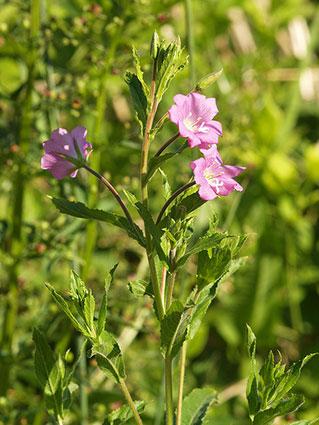
The pale, pinkish purple-hued, small flowered willow herb is popular in Europe and making a name for itself in the United States. It's known for being beneficial to prostate health.
Growing and Harvesting
Small flowered willow herb (Epilobium parviflorum) is a member of the primrose family. Its trademark is its very small flowers. Often considered a weed, the herb's tiny seeds spread easily, similar to a dandelion's.
The popular German herbalist Maria Treben helped the herb rise to popularity in her book, Health through God's Pharmacy. In the book, Treben cites several stories about small flowered willow being effective against prostate issues.
Easily Grown
According to Strictly Medicinal Seeds, small flowered willow is easy to grow from seed. You can pick the wild seeds and sow them or purchase seed packets.
Small flowered willow thrives in part shade and does well in coastal or mountain areas. The herb takes about 60 days to mature and will spread when given ample space. Small willow herb stems, leaves and flowers can be harvested for use. Treben recommends picking the herb in the middle of the stem so that it develops side shoots.
Uses

The main use for small flowered willow is to support prostate and urinary tract health. It's also a folk remedy for sexual dysfunction.
The herb contains flavanoids, polyphenols and tannins, and beta-sitosterol, a plant sterol ester used in medicine. Beta-sitosterol is found in saw palmetto, another herb used to treat the prostate. WebMD states that beta-sitosterol is "likely effective" in treating benign prostatic hyperplasia (BPH). BPH causes an enlarged prostate and leads to symptoms including urinary urgency and frequency, difficulty urinating, weak urine stream, and incomplete bladder emptying.
Researchers are beginning to take a look at using small flowered willow to treat prostate cancer. In one in vitro study, Epilobium extracts (including Epilobium parviflorum) showed activation against specific prostate cancer cells, reports a Pub Med abstract.
How to Use
Small flowered willow is available in dried, fresh, extract or supplement forms. To make small flowered willow tea, Treben recommends adding one heaping teaspoon of the dried herb to 1/4 liter boiling water, steeping the tea, and drinking one cup on an empty stomach in the morning. You can also add one teaspoon of small flowered willow extract to sixteen ounces of boiling water.
Supplements should be taken per package instructions.
Side Effects and Interactions
Small flowered willow has no known reported adverse side effects or drug interactions. However, WebMD indicates that beta-sitosterol may cause:
- Nausea
- Indigestion
- Gas
- Diarrhea
- Constipation
Ironically, even though small flowered willow is used to support sexual health, WebMD mentions that beta-sitosterol has been linked to sexual dysfunction and libido loss. Women who are pregnant or breastfeeding or people who have sitosterolemia should avoid small flowered willow herb.
Potential drug interactions with beta-sitosterol include Zetia and Pravachol. Taking beta-sitosterol with these drugs may reduce the effectiveness of the compound.
Promising and Gentle Herb
Small flowered willow is easy to grow and shows promise in treating common and often devastating prostate problems. Anecdotal evidence abounds in support the herb's potent healing abilities. And most research performed to date shows the herb is safe and has impressive medicinal potential. However, human studies are needed to prove its efficacy. You should consult your doctor or a natural health practitioner before using small flowered willow herb.







